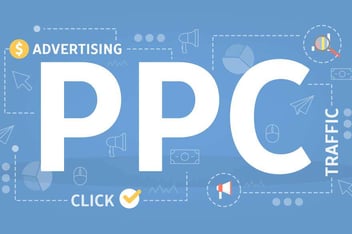¿Qué es una campaña PPC y cómo obtener los mejores resultados? [Vídeo]
Nos dedicamos al marketing de contenidos. Sin embargo, también sabemos que es esencial entender la publicidad de pago y las campañas de pago por clic. ¿Qué es? ¿Dónde y cómo utilizarla eficazmente?
![¿Qué es una campaña PPC y cómo obtener los mejores resultados? [Vídeo]](https://blog.aspiration.marketing/hs-fs/hubfs/Aspiration%20Marketing/Blog%20Images/PPC%20Campaigns.webp?width=800&height=450&name=PPC%20Campaigns.webp)
La publicidad pagada implica invertir en la colocación de anuncios en línea en sitios web, resultados de búsqueda u otras plataformas digitales. Esta modalidad abarca diversas opciones, como el pago por clic (PPC), donde el anunciante abona una tarifa cada vez que su anuncio recibe un clic (CPC o costo por clic), y el pago por impresión (CPI), donde se paga una tarifa por cada vez que el anuncio se muestra a un usuario.
La publicidad de pago permite a las empresas llegar a un público más amplio y aumentar la notoriedad de su marca. Puede ser una estrategia de marketing eficaz, pero también puede ser cara, por lo que es esencial que las empresas consideren cuidadosamente su presupuesto y objetivos antes de embarcarse en una campaña de publicidad de pago.
En una campaña de pago por clic, los anunciantes pagan una tarifa cada vez que se hace clic en uno de sus anuncios. Las campañas de PPC constan de varios anuncios agrupados por servicio, buyer persona, datos demográficos, etc., y pueden ejecutarse en motores de búsqueda, plataformas de redes sociales y otros sitios web que ofrecen espacio publicitario.
En una campaña de publicidad de pago, el anunciante crea un anuncio y elige palabras clave específicas relevantes para su negocio y su público objetivo. Cuando un usuario busca una de esas palabras clave, el anuncio del anunciante puede aparecer en los resultados de la búsqueda. Con el PPC, el anunciante cobra una tarifa cada vez que se hace clic en el anuncio.
El objetivo principal es dirigir tráfico específico a un sitio web y aumentar las conversiones, como ventas o clientes potenciales. Estas campañas pueden ser eficaces, pero también caras si no se gestionan correctamente. Es fundamental que las empresas consideren detenidamente su presupuesto y sus objetivos antes de lanzar la campaña y que la supervisen y optimicen periódicamente para asegurarse de que obtienen el máximo rendimiento de la inversión.
Repasemos los pasos, los procesos y, sencillamente, el trabajo duro que conlleva el éxito de una campaña.
Lanzar una campaña PPC con éxito
Las campañas PPC elaboradas estratégicamente pueden proporcionar tráfico, clientes potenciales y clientes en cuanto empiezan a funcionar, PERO son complejas y requieren una planificación cuidadosa. Para tener una campaña exitosa, debe completar los siguientes pasos:
1. Investigue
Comience con la investigación de clientes, ya que necesita saber qué quieren sus clientes, qué buscan y cómo lo buscan. Usted puede simplemente cargar con palabras clave y apretar el gatillo, PERO su campaña será un fracaso si los clientes potenciales no están utilizando las frases que usted está apuntando. Y gastará mucho dinero sin conseguir conversiones.
Recurra a todos los datos de clientes de que disponga, incluido el perfil detallado del comprador, para comenzar con la lluvia de ideas de palabras clave. La lista inicial de palabras clave se compone de todo lo que sus clientes podrían utilizar para encontrarle.
2. Elabore una lista de palabras clave
Una palabra clave PPC eficaz es:
- Relevante - Sólo puja por palabras clave estrechamente relacionadas con lo que vendes.
-
Exhaustiva: su investigación incluye los términos más populares y más buscados de su nicho y palabras clave de cola larga más específicas y menos comunes. En total, las palabras clave de cola larga representan la mayor parte del tráfico generado por las búsquedas. Son menos competitivas y, por tanto, menos caras.
-
Expansivo - El PPC es iterativo. Usted perfecciona y amplía constantemente sus campañas. La lista de palabras clave crece y se adapta. Clasifique y filtre por relevancia para su sitio, uso generalizado e historial (o probabilidad) de conversión.
-
No olvide las palabras clave negativas : señale las palabras clave que puedan atraer al público equivocado. Se trata de palabras clave negativas, y su uso impide que el anuncio se muestre cuando alguien las utiliza en una búsqueda, lo que le ahorra dinero y hace que su anuncio llegue a las personas adecuadas.
3. Investigue a su competencia
Puedes ver cómo posicionan sus anuncios otras empresas utilizando herramientas online. Y si ves empresas irrelevantes pujando por tus palabras clave, reevalúa si esas palabras clave llegarán o no a tu audiencia.
4. Escriba mejores textos publicitarios
Su audiencia y la investigación de palabras clave le permiten comprender la psicología de sus clientes para que pueda escribir un texto que los convierta de la forma más eficaz. Asegúrese de que el texto del anuncio sea convincente. Al fin y al cabo, tiene un espacio limitado. Encuentre el hueco en las ofertas de sus competidores y aprovéchelo.
Su oferta debe ser irresistible, ofrecer su propuesta única de venta (USP) y aclarar lo que le espera al usuario al otro lado del clic. Piense en cómo eclipsa a sus competidores, qué hace que sus clientes le compren y qué hace que vuelvan.
Más allá de la USP, cuando construya un copy, recuerde:
-
Que sea valioso: no compita en precios. Lo que anuncies, hazlo más atractivo que el precio.
-
Hazlocreíble - No hagas que lo que ofreces en un anuncio parezca demasiado bueno para ser verdad. Los consumidores son cazadores de gangas, pero tienen cuidado con dónde gastan el dinero.
-
Afronte la aversión al riesgo: incluya garantías o alguna otra señal de confianza para ayudar a convertir a los clientes con aversión al riesgo.
-
Incluya palabras clave: son necesarias para que sus anuncios se muestren. Asegúrese de que encajan de forma natural.
5. Cree una llamada a la acción potente y relevante
Este punto habla por sí solo. Debe inspirar a cualquiera que se encuentre con su anuncio PPC a dar el siguiente paso, hacer clic y obtener más información.
6. Cree una página de destino atractiva y acogedora
Y cuando hagan clic, no envíe el tráfico del anuncio a su página de inicio. A medida que el tráfico pasa por su anuncio PPC, debe enviar a los visitantes a una página de destino creada específicamente para esa campaña.
Al decidir cuál será la página de destino:
-
Elabore contenidos y descripciones de productos específicos para el público objetivo. No escriba para un público general ni sea impreciso.
-
Consulte su investigación de audiencia para elaborar declaraciones de beneficios específicas que comuniquen valor.
-
Asegúrese de optimizar la página de destino para que se cargue rápidamente. Asegúrese también de que funciona en móviles.
-
No olvide eliminar la navegación de la página de destino, ya que lo que desea es que los usuarios centren su atención en la oferta. La navegación debe reaparecer en la página de agradecimiento una vez que se hayan convertido.
Al igual que el texto de su anuncio es esencial para dirigir el tráfico adecuado a su sitio web, una página de destino optimizada es fundamental para maximizar las tasas de conversión de su publicidad de pago por clic.
Después de haber hecho todo el trabajo y de que su campaña esté en marcha, aún le queda trabajo por hacer.
Gestión eficaz del PPC
Si configura su campaña publicitaria de forma incorrecta, se quedará con la cartera vacía y con clientes potenciales de baja calidad o sin clientes potenciales en absoluto. La mayoría de las pequeñas empresas entran en esta categoría. Son más las campañas publicitarias que fracasan que las que tienen éxito.
Sepa qué hacer y qué NO hacer:
Haga que el marketing PPC funcione para usted
-
Ponga en pausa su cuenta antes de gastar dinero. Tenga en cuenta sus objetivos. No se conforme con la configuración predeterminada a menos que vea que le beneficia.
-
Ajustar la configuración de publicidad para que funcione para usted parece obvio, pero no suele ser intuitivo en la interfaz de la herramienta.
Sé realista con tus expectativas.
-
El PPC puede ser una forma estupenda de generar clientes potenciales si estás dispuesto a aprender a hacerlo funcionar y empiezas con unas expectativas razonables. Sea honesto, minucioso y realista.
Conozca sus números.
-
Sepa qué métricas son críticas para su negocio y cómo espera que el PPC afecte a estas cifras.
Gaste algo de dinero.
-
El primer mes de publicidad PPC se trata de probar el mercado para la mejor estrategia a largo plazo. El uso de términos de búsqueda ampliamente definidos para ayudarle a desarrollar listas de palabras clave más ajustadas utilizando datos reales es aceptable.
-
El uso temporal de términos amplios proporciona variaciones de palabras clave e ideas de palabras clave negativas que ayudan a crear una campaña publicitaria completa.
-
Dedicar tiempo a extraer informes de consultas de búsqueda significa que cada mes será más eficiente. Utiliza algo de dinero por adelantado para obtener mejores resultados a largo plazo.
-
Céntrese en encontrar las mejores oportunidades publicitarias. Supervise de cerca los informes de consultas de búsqueda. Verá qué palabras clave son más prometedoras y cuáles malgastan dinero.
-
A medida que pase el tiempo, podrá refinar mejor su estrategia y eliminar los términos de búsqueda de concordancia amplia.
Ponga a punto el embudo con optimizaciones que repercutan en los resultados
-
Defina listas de palabras clave y busque en los informes de consultas de búsqueda palabras clave negativas y nuevas oportunidades de palabras clave de cola larga.
-
Utilice las pruebas de anuncios para encontrar los anuncios con mejor rendimiento y aumentar sus puntuaciones de calidad.
-
Mejore la relevancia de su página de destino con respecto a los anuncios con mejores resultados.
Sea más eficiente
-
Utilice palabras clave de coincidencia exacta y listas de remarketing
Sea más preciso
-
Sea el más adecuado para la búsqueda y ofrezca la mejor respuesta
HAGA diligencia diaria
-
Sus cuentas PPC requieren un mantenimiento diario para garantizar que obtiene los mejores resultados.
-
Es esta diligencia diaria la que da lugar a campañas sanas y rentables.
NO invierta dinero en promocionar un producto que aún no ha encontrado su público.
-
La publicidad PPC no le llevará hasta allí si no ha conseguido que el producto encaje en el mercado. Las mejores campañas de PPC no salvarán un producto defectuoso sin mercado para los clientes.
-
Puedes hacer todo bien con una campaña de PPC, pero si tus clientes objetivo no quieren lo que ofreces, el PPC no dará los resultados esperados.
NO entre en la publicidad PPC con la expectativa de que puede establecerla y olvidarse de ella.
-
El mantenimiento es esencial por un sinfín de razones, como se ha comentado anteriormente.
Por último, unas breves palabras sobre los canales y las plataformas publicitarias. ¿Dónde se puede hacer todo lo que se ha dicho en este post?
Facebook y Google ads son más o menos los dueños del espacio PPC. Algunos actores más pequeños pueden ser viables en algunas circunstancias. En caso de duda, busque un profesional del marketing digital con el que hablar sobre dónde quiere invertir su energía, esfuerzo y dinero en PPC.
This content is also available in:
- Deutsch: PPC-Kampagnen: Definition & Top-Ergebnisse erhalten [Video]
- English: What Is a PPC Campaign and How Do I Get the Best Results? [Video]
- Français: Campagne PPC: Qu'est-ce que c'est & Meilleurs Résultats ? [Vidéo]
- Italiano: Campagna PPC: Cos'è e come ottenere i migliori risultati? [Video]
- Română: Campanie PPC: Ce e și cum obții cele mai bune rezultate? [Video]
- 简体中文: 什么是 PPC 活动?如何获得最佳效果?视频








Deja un comentario